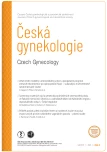Systemic lupus erythematosus and secondary antiphospholipid syndrome in native sisters with reduced fertility
Authors:
Z. Ulčová-Gallová 1,2
; Mukenšnabl P. 3; Dzurillová Ž. 4; Lošan P. 1
Authors‘ workplace:
Genetika-Plzeň s. r. o., Next-Clinics Czech a. s., Plzeň
1; Gynekologicko-porodnická klinika LF UK a FN Plzeň
2; Šiklův ústav patologie, LF UK a FN Plzeň
3; Medicentrum Dzurilla, Nitra, Slovensko
4
Published in:
Ceska Gynekol 2022; 87(3): 198-201
Category:
Case Report
doi:
https://doi.org/10.48095/cccg2022198
Overview
Objective: Systemic lupus erythematosus (SLE) and secondary anti-phospholipid syndrome (APS II) can cause increased morbidity and mortality of the fetus. We followed the course of fertility of two sisters with these two basic diseases. Methods: In the Center for Immunology of Reproduction, we confi rmed both sisters had increased levels of some selected anti-phospholipid antibodies (against phosphatidylserine, phosphatidylethanolamine, phosphatidylinositol, DL-glycerole, anexin V, phoshatidic acid, cardiolipin, beta2-glycoprotein I), anti-nuclear, and anti-DNA antibodies. During the established immunosuppressive and hormonal therapy at the time of SLE remission, both sisters became pregnant. There was a physiological progression of pregnancy until the 19th week. Results: At the 20th week of pregnancy, the older sister miscarried again, and the younger sister developed hypertension in the 31st week of pregnancy which was terminated by caesarean section. Conclusion: In our causal evaluation, we addressed two serious autoimmune diseases (SLE, APS II) in two sisters and described their course of pregnancy. However, only one of them became a happy mother.
Keywords:
infertility – Systemic lupus erythematosus – secondary antiphospholipid syndrome
Sources
1. Kivity S, Ehrenfeld N. Can we explain the higher prevalence of autoimmune disease in women? Expert Rev Clin Immunol 2010; 6(5): 691–694. doi: 10.1586/ eci.10.60.
2. Battaglia M, Garret-Sinha LA. Bacterial infection in lupus: roles in promoting activation and in pathogenesis of the disease. J Transl Autoimmun 2021; 4: 100078. doi: 10.1016/ j.jtauto.2020.100078.
3. Krejsek J, Kopecký O. Klinická imunologie. Hradec Králové: Nukleus 2004.
4. Mockova A, Ulcova-Gallova Z, Nahlovsky J et al. Occurrence of selected antiphospholipid antibodies in offspring born from mothers with autoimmunity. Lupus 2012; 21(7): 793–795. doi: 10.1177/ 0961203312437808.
5. Kwak-Kim J, Park JC, Ahn HK et al. Immunological modes of pregnancy loss. Am J Reprod Immunol 2010; 63(6): 611–623. doi: 10.1111/ j.1600-0897.2010.00847.x.
6. Holáň V. Imunologická tolerance. In: Ulčová- Gallová Z, Madar J eds. Imunologie a imunopatologie lidské reprodukce. 2. vyd. Praha: Maxdorf 2020.
7. Larosa M, Del Ros T, Calligaro A et al. Clinical outcomes and predictors of maternal and fetal complications in pregnancies of patients with systemic lupus erythematosus. Expert Rev Clin Immunol 2019; 15(6): 617–627. doi: 10.1080/ 1744666X.2019.1601557.
8. Hickman RA, Gordon C. Causes and management of infertility in systemic lupus erythematosus. Rheumatology (Oxford) 2011; 50(9): 1551–1558. doi: 10.1093/ rheumatology/ ker105.
9. Carp HJ, Selmi C, Shoenfeld Y. The autoimmune bases of infertility and pregnancy loss. J Autoimmun 2012; 38(2–3): J266–J274. doi: 10.1016/ j.jaut.2011.11.016.
10. Rekvig PO. Autoimmunity and SLE: factual and semantic evidence based critical analysis of definition, etiology, and pathogenesis. Front Immunol 2020;
11: 569234. doi: 10.3389/ fimmu.2020.569234. 11. Ulčová-Gallová Z, Bouda J. Gravidita u žen s ně kte rými autoimunitními chorobami. Ceska Gynekol 1993; 58(4): 28–30.
12. Ulčová-Gallová Z. Poznámky k léčbě žen s autoimunitním onemocněním. Gynekolog 1994; 3: 208–209.
13. Ulčová-Gallová Z, Rokyta Z. Systémový lupus erythematodes a pohlavní hormony. Ceska Gynekol 1998; 63(3):251–253.
14. Nováčková M, Binder T, Jančíková B et al. Průběh těhotenství a porodu u pacientky se systémovým lupus erythematodes. Ceska Gynekol 2004; 69(3): 193–196.
Labels
Paediatric gynaecology Gynaecology and obstetrics Reproduction medicineArticle was published in
Czech Gynaecology

2022 Issue 3
Most read in this issue
- Cesarean scar pregnancy
- Hydronephrosis as a symptom of clinically silent ureteral endometriosis
- Ovarian tumors and genetic predisposition
- Complete androgen insensitivity syndrome – rare case of malignancy of dysgenetic gonads
